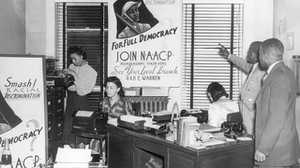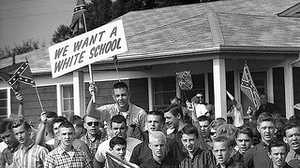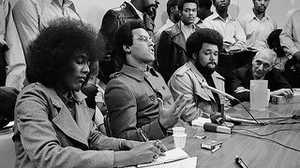Going Into Politics

Maynard Jackson chose to enter politics in 1968, after the assassinations of national figures Martin Luther King, Jr. and Robert Kennedy. Though he lost his first U.S. senatorial bid that year, he was elected vice mayor of Atlanta in 1969. He ran for mayor in 1973 — and won, becoming the first African American mayor of a major southern city.
by Maynard Jackson
When I was seven, we moved to Atlanta from Dallas, Texas, where I was born. Atlanta is my mother's native home. It was hard-core segregation all the way, but we never bowed to it. It was against the family policy. We never walked in anybody's back door, ever. I've walked into shoe stores with my father, my grandfather, to be fitted for shoes. We would sit down and they would ask us to move to the back of the shoe store, and we'd explain we're going to spend our money, we sit anywhere we want to. They said, "Well, you gotta go to the back." We said, "I'm sorry, no, we don't have to go to the back. Our choice is to go to the back or leave, and we're leaving."
Martin Luther King, Jr., was buried the day after my first child was born, my daughter Brooke. She was born April the eighth of 1968. I went from the hospital to the grave. And I spent three days thinking about what I was going to do with my life and decided that politics, although not perfect, was the best available nonviolent means of changing how we live. That's when I know I decided to get into politics. But I thought even then it would take a long time to phase into it -- two, three, four years. I wanted to build a law firm. Lo and behold, less than two months later, after declining to run for the state house [of representatives] and telling a group of neighbors that I would not do that, I sat down to watch the Democratic returns from the California primary and saw Bobby Kennedy shot to death. When that went off finally, early in the morning hours, the late news had been delayed and came on, announcing that Herman Talmadge, then the U.S. senator from Georgia, was going to run [for reelection]. The next day — that day, really — was the last day to qualify, June the fifth of 1968, for U.S. Senate, and apparently nobody was going to oppose Talmadge. So I went to work that morning and I resigned my job, spent all day borrowing three thousand dollars for the qualifying fee, and ran for U.S. Senate. That was twenty years ago. I was thirty years old.
Being the first black mayor is what you wish on your enemy, okay? And I say that with tongue in cheek -- it's a source of great pride to be mayor of Atlanta, and every black mayor who's been the first black mayor, I'm sure, has felt the same thing. But it truly is part hell. All of a sudden, I became the mayor not just of Atlanta, but of black people in Georgia and even some neighboring states. That was an extraordinary burden. But in the city of Atlanta alone, we had to deal with that tremendous expectation in the black community. Now, equally important and equally difficult was what we found in the white community: exaggerated anxiety. That anxiety was, "Oh, my God, what are we going to do?" We've got a black mayor! What does this mean? Is this the end of Atlanta?"
Where the anxiety was reflected most, strangely, was in our newspapers. I've seen bad press. But for the first two years that I was mayor, the press was almost hysterical. And not until the then-editor of the Atlanta Constitution, Reg Murphy, left town, two years into my first term as mayor, did things begin to settle down, and did a more objective, more dispassionate look by the newspapers occur as they reviewed our actions in the administration. We didn't expect anybody to say, "Hey, we're on your side." We just wanted fairness, evenhandedness.
When I became mayor, zero-point-five percent of all the contracts of the city of Atlanta went to Afro-Americans, in a city which at that time was fifty-fifty. There were no women department heads. This was not only a question of race; it was a question also of sexual discrimination and, you know, all the typical "isms." If there's one, normally there's a whole bunch of them, and they were all there. We had to change dramatically how the appointments to jobs went, normal hiring practices in city government went, the contracting process — not to reduce the quality, by the way, ever. We never ever, ever set up a lower standard. And those who say, "Well, affirmative actionmeans you've got to lower the standard" — that's a real insult, in my opinion, to African-Americans and other minority Americans. We never did it, didn't have to do it.
From Hampton, Henry, and Steve Fayer, Voices of Freedom: An Oral History of the Civil Rights Movement from the 1950s Through the 1980s (New York: Bantam Books, 1990), pp. 622, 623-624, 629-630, 631.







